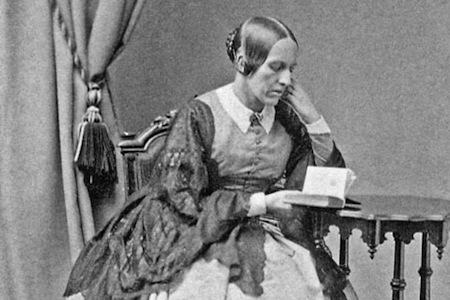Learning to "Lean In" from Our Nineteenth-Century Ancestors

Caroline Wells Healey Dall in the 1870s. Credit: Smithsonian.
 Facebook COO Sheryl Sandberg says women "hold ourselves back" when we should be advocating for ourselves and "leaning in." If only she had known Caroline Healey Dall! With other feminists one hundred fifty years ago, Dall spoke up for herself. Early feminists advocated for each other too. Their tools and methods for smashing through and stepping over barriers may still be sharp and effective.
Facebook COO Sheryl Sandberg says women "hold ourselves back" when we should be advocating for ourselves and "leaning in." If only she had known Caroline Healey Dall! With other feminists one hundred fifty years ago, Dall spoke up for herself. Early feminists advocated for each other too. Their tools and methods for smashing through and stepping over barriers may still be sharp and effective.
Dall's first public speech in 1855 at the Women's Rights convention in Boston, which she gave on Massachusetts laws, made her very nervous. Women's speaking in public, especially to mixed audiences, was barely proper. But she was so thrilled by her speech's reception that she clipped pages of newspaper accounts of the talk for her scrapbook. She recorded friends' and strangers' praise of it in the extraordinary diary she began at age 15 and kept for 75-years -- such persistence as a diarist shows she thought her ideas mattered. Beginning with obligatory self-deprecation, she went on to treasure up admiration and acknowledgment, relishing the comparison to eminent orator Daniel Webster:
My report . . . had a most unmerited success. E.P. Whipple said it was the ablest thing done in the Convention, some stupid person that it would have done Dan. Webster credit.! –! . . . Several pressed my hand silently or said "I am glad you belong to Boston." Miss Hunt said, “How brave and beautiful you have been.” Mrs. Severance, with her clear true face, “Noble words!”
And pages more. She had learned from other women who stuck up for themselves. As a teenager, she'd taken notes at Margaret Fuller's "conversations," where Fuller developed transcendental philosophy and earned money to support her family. Dall had confidently spoke up in sessions attended by Ralph Waldo Emerson, even when her mentor, Elizabeth Peabody, told her she was too bold.
Economic need spurred her next moves. Her husband, a minister, had suffered a nervous breakdown and sailed off to missionary work in India, leaving her to support two children essentially as a single mother. Attending a lecture by a male friend suggested a career direction. She was heartened by how mediocre his lecture was. Evidently, the bar was lower than she'd believed. Perhaps she recognized that, as Sandberg explains, men apply for jobs that they're only 60 percent qualified for, while women hold back unless they're 100 percent. Dall guessed at the fee her friend had received, and then took her public speaking the next, more daring step: speaking to public mixed audiences of men and women for pay.
She'd been wise to stockpile appreciation for her public speaking, since her family was happy to tear her down: A sister scolded her for wanting to lecture in public, and her mother planted further doubts.
When Dall gave her first paid speech, "The Dignity of Woman," the Boston Evening Traveller published a brief account. It was not to her liking. The paper said she differed with most other women's rights activists and she worried that this description would cost her speaking engagements. So Dall wrote a spirited eight-paragraph analysis of their article, pointing out its sexist assumptions and errors -- with style. Long before Sandberg noted that in positions of authority "the word 'female' implies a bit of a surprise," Dall got in a dig at the assumption that "male" equals normal:
“Lecture by a female.” Female what? Parrot, popinjay, or monkey? This phrase does not hurt me on my own account, but I confess that I am weary of this popular coarseness. ... If, after a brilliant political dinner, you were to see this caption -- Fine speech by a male -- what should you think? That your compositor had gone crazy, I am sure.
After thus parlaying her rebuttal into more newspaper publicity for her talks, she sent her reply around, seeking more speaking engagements. If digital social networking had been around, she would have been sharing that post on all her friends' timelines and tweeting it like mad. Dall spoke back to the media and through it to readers, teaching them that it was wrong and even crazy to assume that speakers were naturally male.
After her exchange with the Traveller, Dall did not leave her reputation to chance. She pulled in favors from male allies -- something men rarely accord to women, according to Sandberg -- and lined them up to write about her talks. Their articles appeared anonymously, as was common. But her notes on her scrapbook clippings let her remember that it was William Lloyd Garrison who called her a “superior lecturer,” or that popular orator Thomas Starr King regarded her as “amply qualified by abilities, by faithful preparation, and enthusiasm for her subject, to do justice to the themes she will treat.”
She had learned to advocate for herself and to gather her supporters. At this juncture in contemporary America, when Sheryl Sandberg tells women to act more like men, the history we review during Women’s History Month should remind us that examples of how to stand up for ourselves come from ancestors who never set foot in a corporate boardroom.
